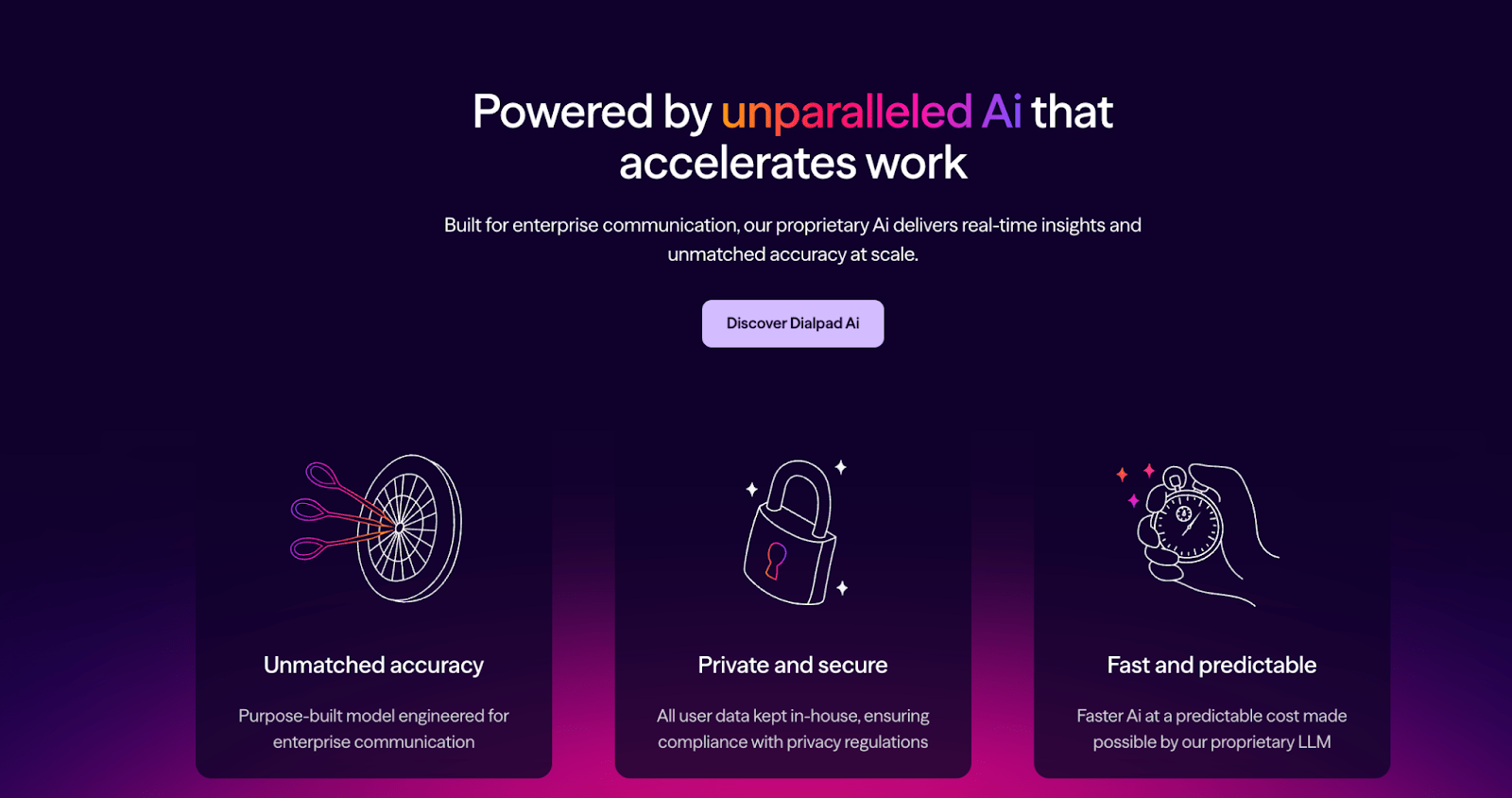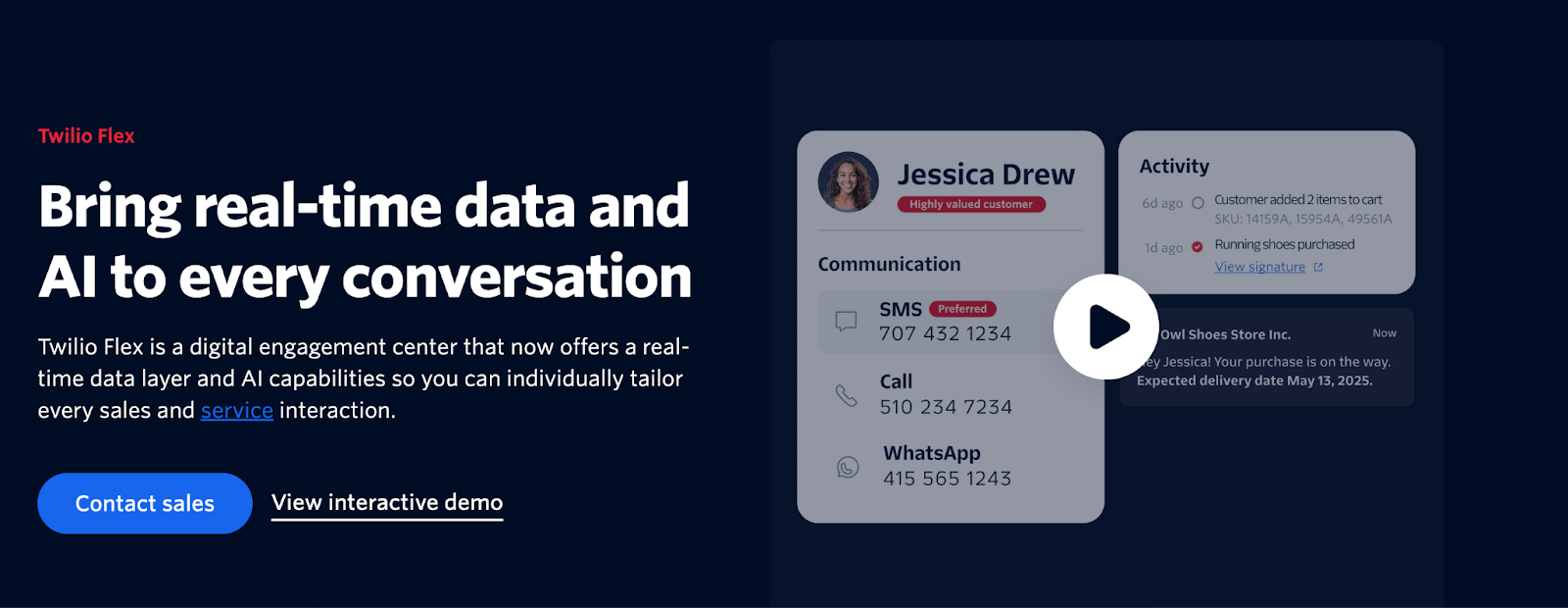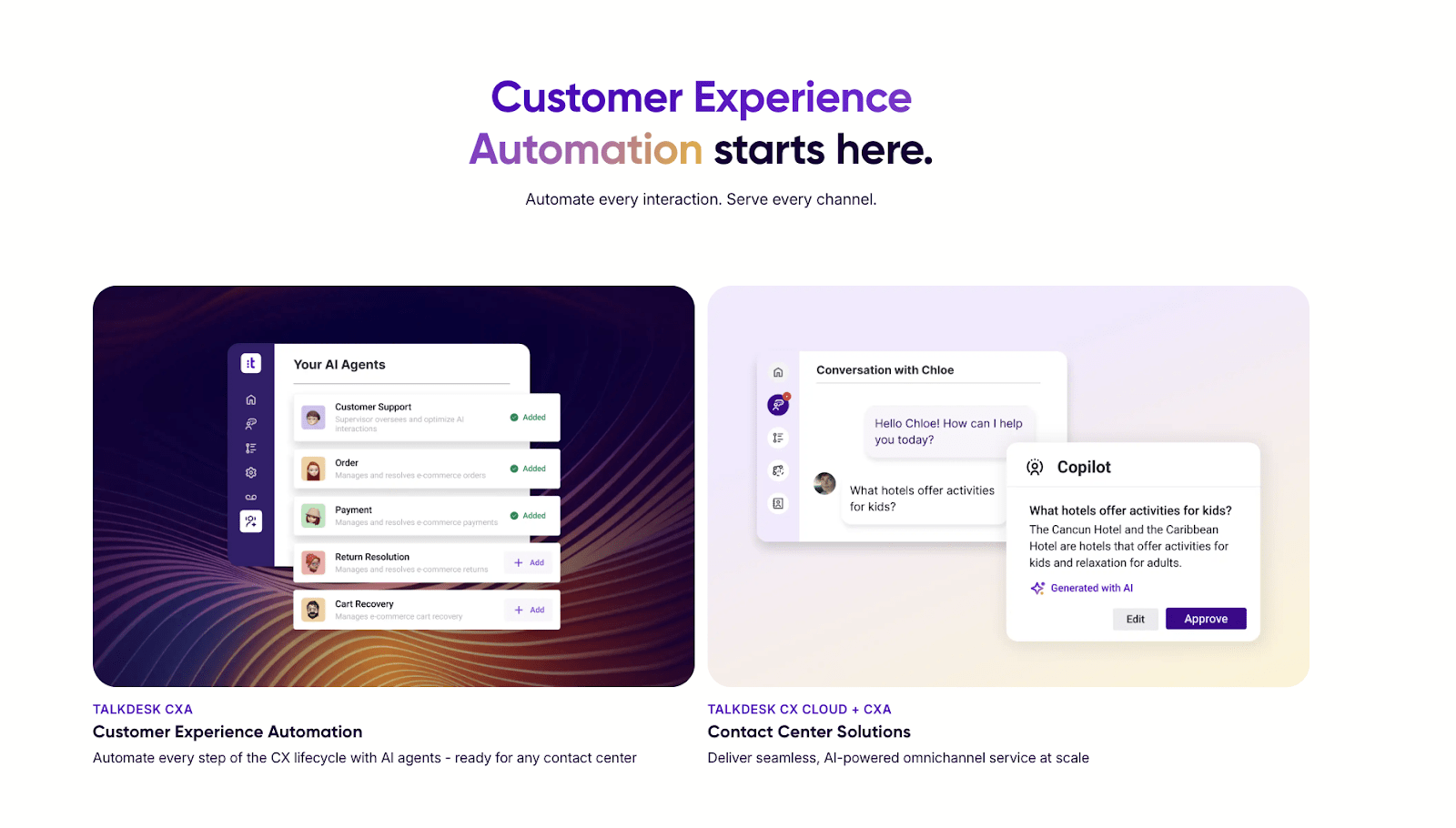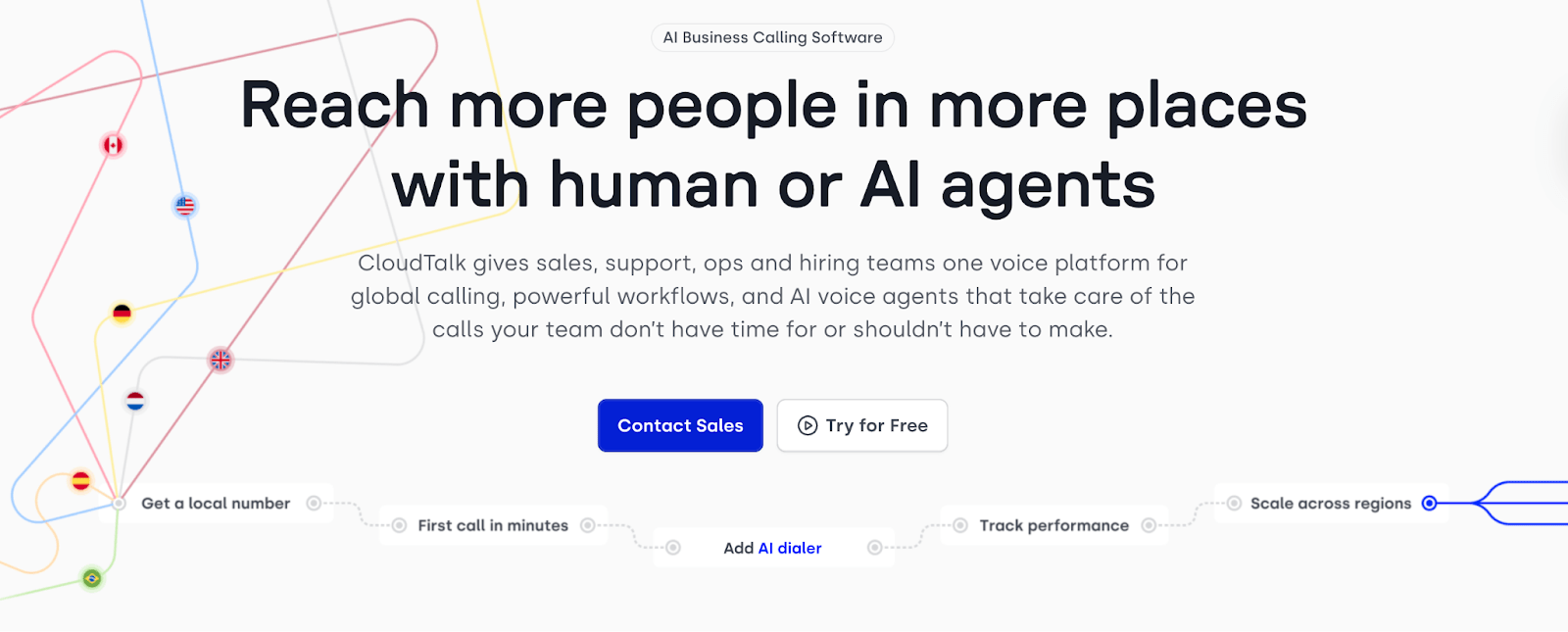Best IVR with Conversational AI

If you’ve set up a phone system that requires callers to press a number to qualify, but most people skip it or simply wait for a human, an Interactive Voice Response (IVR) will be the best solution for this problem.
With this tool, users can articulate what they want from the business, and the AI-based bot connects them to a suitable representative. Various studies have shown that a well-designed IVR with conversational AI can reduce customer service costs by up to 30% by handling routine inquiries, allowing agents to focus on more complex issues.
Curious about how such systems can help you? Keep reading this article to find the answer to all your questions.
The Importance Of AI In IVR Tools
IVRs save time for both your clients and your staff. Instead of following boring instructions like “press 1 to view all home insurance packages”, a user will talk with a virtual agent. Conversational AI IVR tools transform customer experience by:
- Understanding natural language to streamline communication
- Fast and intelligent call routing
- Keeping callers engaged by removing frustrating button-pressing steps
- Conversational IVR software handles queries 24/7
- AI tools help you identify trends, customer sentiment, and optimize flows.
Choosing a suitable IVR system can help your business become even more personalized. For businesses, this means reduced operational costs, faster response times, and higher customer satisfaction. For pay-per-call affiliates, IVR unlocks precise call qualification by filtering out low-value leads before they reach the advertiser.
To save you time, we’ve gathered the five best IVR providers in one place, so you can choose the one that perfectly fits your case.
Phonexa
Main Features:
- Conversational AI IVR flows with built-in call logic
- Seamless integration with email, web, and lead tracking systems
- Drag-and-drop call journey builder
- Real-time reporting and ROI dashboards

Phonexa is a call management suite tailored for marketers, lead gen agencies, and businesses that rely heavily on inbound calls. Its IVR platform is designed for smart decision-making, thanks to features such as voice analytics, intelligent call routing, call tracking, and lead scoring.
With strong onboarding, detailed documentation, and enterprise-grade support, this IVR service provider will be a great choice for businesses looking to streamline their call-based funnels and track leads across multiple touchpoints.
| Pros | Cons |
| AI-powered call routing with logic branching and voice-based triggers | Requires a learning curve due to its wide feature set |
| Full ecosystem for lead capture, call tracking, email, and analytics | It may be too expensive for small businesses with basic IVR needs |
| Great for high-volume campaigns | |
| Built-in tools for granular attribution and ROI tracking |
Dialpad
Main Features:
- AI-powered IVR software with real-time transcription due to natural language processing (NLP)
- Unified voice, video, messaging, and contact center platform
- Sentiment analysis in real-time
- Mobile-oriented experience

This tool is an excellent choice for companies looking for cloud-based inbound call tools. Its AI-driven IVR solutions support voice-based input, so clients can speak how they want, and these tools will still understand them and route to the desired agent.
Beyond its conversational AI IVR, Dialpad can help you deliver a unified communications suite that blends voice, video, and messaging. This service is ideal for fast-paced teams that require in-depth insights without added complexity.
| Pros | Cons |
| Smart, speech-enabled natural language IVR | AI insights are strongest in English, with limited depth in some other languages |
| Real-time call transcription and searchable voice data | May lack advanced call tree customization compared to other platforms in the list |
| Easy-to-use platform with minimal setup time | Voice analytics is not as deep as enterprise-grade tools |
| Integrations with popular tools such as Google Workspace, Microsoft 365, Salesforce, etc |
Twilio Flex
Distinctive Features:
- Fully programmable IVR software with support for LLM-based bots
- Developer-friendly platform with full API and component-level control
- Omnichannel: voice, chat, SMS, WhatsApp, email, and custom channels

Twilio Flex is a fully customizable platform built for teams that want complete control over every interaction. Flex allows you to design conversational IVR experiences using voice bots, NLP, and AI models like GPT, making it suitable for businesses that need intelligent real-time routing across channels.
Its architecture is API-first and cloud-native, allowing you to scale without being locked into rigid templates. If you have developer resources and high-volume customer interactions, Twilio Flex is one of the IVR solution providers that is worthy of your attention.
| Pros | Cons |
| Unmatched flexibility for building custom IVR logic and AI experiences | If you don’t optimize well, you may spend far more than expected on the usage-based pricing |
| Supports omnichannel communication in one unified view | Requires developers or technical teams to implement and maintain |
| Easy integration with advanced AI platforms (GPT, Dialogflow, Lex, etc.) | No-code options are limited compared to other platforms |
| Scales to enterprise-grade use cases with granular control |
Talkdesk
Unique Features:
- Enterprise-grade conversational AI IVR with natural language understanding (NLU)
- Real-time speech analytics and call transcription
- Drag-and-drop call flow builder for customizable menus
- Native integrations with Zendesk, Salesforce, Microsoft Dynamics, and other CRMs

Talkdesk combines powerful AI-powered IVR capabilities for mid-sized to large customer support teams. Its conversational AI enhances the caller experience and improves first-contact resolution rates.
With strong CRM integration and real-time analytics, Talkdesk IVR software helps businesses deliver personalized, efficient customer service while continuously optimizing call handling processes.
| Pros | Cons |
| Advanced conversational AI IVR platform with intent-based routing | Pricing can be high for smaller teams |
| Real-time speech analytics and sentiment detection | Some advanced AI features may require additional modules |
| Flexible, no-code IVR builder | Customization complexity can grow with large call flows |
| Deep integrations with popular CRMs |
CloudTalk
Key Features:
- Cloud-based IVR with smart voice routing
- Supports multi-language IVR menus
- Integrates seamlessly with CRM systems like HubSpot or Salesforce
- Real-time analytics with extensive performance dashboards

It is a great application for small and medium-sized companies looking for a powerful conversational AI IVR system. It combines smart routing with multilingual support, making it perfect for global teams.
This IVR calling software platform focuses on improving customer experience and operational efficiency by intelligently connecting callers to the right agents while providing managers with clear insights through robust analytics.
| Pros | Cons |
| Easy-to-use IVR with AI-powered smart routing | Lacks some advanced AI features found in enterprise-grade platforms |
| Multilingual IVR support for diverse customer bases | Customization options are limited compared to developer-centric tools |
| Quick setup and intuitive user experience | May not scale as well for huge contact centers |
| Good value for SMBs with essential call center features |
Conclusion

Choosing the right conversational AI IVR provider helps you improve customer experience by reducing call handling and streamlining support operations. For both businesses and pay-per-call affiliates, IVR implementation translates into higher ROI due to better lead qualification, reduced drop-off rates, and more meaningful interactions.
If your business relies on phone communication, a modern IVR is a must-have feature to pre-qualify leads even before they talk with the representative.




